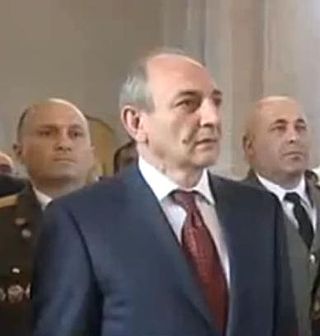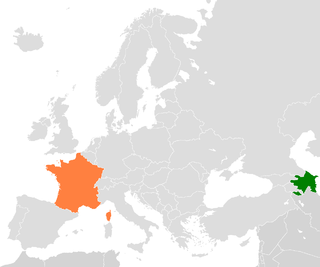This article needs to be updated.(November 2020) |
Until 2023, unless a visa or an official warrant was issued by Azerbaijani authorities, the government of Azerbaijan condemned any visit by foreign citizens to the Republic of Artsakh, its surrounding territories and the Azerbaijani enclaves of Karki, Yuxarı Əskipara, Barxudarlı and Sofulu which are de jure part of Azerbaijan, but were under Armenian control. Azerbaijan considered entering these territories through Armenia (as it was usually the case) a violation of its visa and migration policy. Foreign citizens who entered these territories would be permanently banned from entering Azerbaijan and would be included on the list of "unwelcome people" by the Ministry of Foreign Affairs of Azerbaijan. [1] [2]
Contents
- List
- Date unknown
- 2007
- 2008
- 2009
- 2010
- 2011
- 2012
- 2013
- 2014
- 2015
- 2016
- 2017
- 2019
- 2020
- Removed from the list
- Reaction
- Azerbaijan
- Armenia and Nagorno-Karabakh
- International
- References
The Ministry of Foreign Affairs of Azerbaijan has explained the matter as:
The Ministry of Foreign Affairs of the Republic of Azerbaijan would like to remind all nationals of foreign countries wishing to travel to Nagorno-Karabakh and other occupied regions of Azerbaijan that due to continuing occupation by the Armed Forces of Armenia, these areas are temporarily out of control of the Republic of Azerbaijan.
Any visit without the consent of the Republic of Azerbaijan to the above-mentioned territories, which are internationally recognized as an integral part of Azerbaijan is considered as a violation of sovereignty and territorial integrity of the Republic of Azerbaijan and as a breach of national legislation, as well as relevant norms and principles of international law.
Accordingly, the Ministry calls all foreign nationals to refrain themselves from travelling to the occupied territories in and around the Nagorno-Karabakh region of the Republic of Azerbaijan.The Ministry would like to remind that those who traveled to the occupied territories without prior permission of the Republic of Azerbaijan will be denied the entry to the Republic of Azerbaijan. In case of necessity, appropriate legal actions will be taken with regard to these persons. [3]
As of 10 September 2020, the list of people declared personae non gratae included 1020 people. [4]












